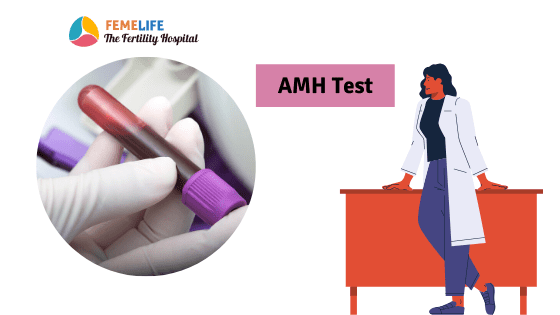
AMH
Among all tests for female infertility, hormone tests are important for fertility treatment. When you visit a fertility specialist, she will ask you to do certain blood tests on the 2nd or 3rd day of your cycle. These are tests to know the efficiency and capacity of your ovaries. These tests include FSH, LH and Oestradiol hormone. Along with these, there is another hormone test called AMH test. This will indicate your fertility efficiency. Almost all fertility centers practice doing this test.
Why AMH test is considered ideal for fertility?
Ovarian reserve plays an important role in fertility treatment. During IVF treatment you will get injections to grow follicles. Your IVF success will depend on the number and quality of eggs. If you have a good ovarian reserve there are more chances of growing good embryos. Hence, an ideal marker is required before IVF treatment. AMH test is considered an ideal marker of ovarian reserve for its accuracy in diagnosing poor response. In other words, AMH is a highly specific test. Other tests like basal follicle-stimulating hormone levels, antral follicle count, are also suggested as ovarian reserve tests that may fulfill this requirement. But serum AMH levels are the most promising parameter. Until 40 years of age, neither FSH nor inhibin B shows a definite correlation with age. Serum AMH level stability regardless of the menstrual cycle makes it much easier to use it to evaluate ovarian reserve than other markers
Also, the serum AMH test is a predictor of pregnancy in IVF for older women. Older women are at high risk for the decreased ovarian response.
What is the Anti-Müllerian hormone (AMH)?
In women, AMH is produced and secreted from ovarian granulosa cells from approximately 36 weeks of gestation to menopause
Anti-Müllerian hormone (AMH), a peptide growth factor. It is well known for its role in sexual differentiation. In men, AMH is secreted from the testes. It promotes the male type of development in the unborn baby (fetus). Without AMH, the male baby may develop uterus, part of the vagina, and fallopian tubes. There is minimal AMH found in the female fetus. Males express AMH earlier and at significantly higher concentrations. After the birth level of AMH declines in the male baby as the testosterone hormone increases. AMH test is used to detect abnormalities of male development.
In females, AMH levels increase after birth. It is exclusively produced by granulosa cells of ovarian follicles. After an initial increase until early adulthood, AMH concentrations slowly decrease. It becomes undetectable at menopause. It indicates the exhaustion of stock of primordial follicles. AMH serum concentration varies in individuals. It accurately reflects the size of the pool of antral follicles. Also, it represents the quantity of the remaining follicles.
What is a normal AMH level?
AMH level is barely detectable in the new-born baby. However, it slowly increases after a few weeks. The level peaks at around 25 years of age in women. The standard levels of AMH test varies between 2 to 4 in young women. It decreases with age and becomes very low for around 40 years.
In women with the poor ovarian capacity, it may be less than 1ng/ml. In PCOS women AMH test is significantly high. It may vary between 4 to 20ng/ml. A high AMH test indicates possible hyperstimulation in IVF treatment.
When should the AMH test be done?
AMH levels fail to follow the endocrine fluctuations that are so typical for the menstrual cycle. In the human ovary, AMH is mainly produced by granulosa cells of small antral follicles sized 2–6 mm. within the normal menstrual cycle, the variability of AMH levels is extremely small. Therefore, a single measurement of AMH obtained at any time in the menstrual cycle may be considered a valid reflection of a woman’s ovarian reserve.
| Age | AMH Level |
| New born Baby girl | Very low |
| After few weeks | Mild increase |
| At around 25 yrs | Highest level |
| 31- 35yrs | Maintains or slightly decreases |
| 35- 40 yrs | Moderate decrease |
| More than 40 yrs | Low |
Why the AMH test is done?
- As a test of ovarian reserve
- As a marker for predicting age at menopause
- As a predictive marker of ovarian response in controlled ovarian stimulation
- AMH levels may vary significantly in women of the same chronological age, allowing AMH to predict the remaining length of a woman’s reproductive lifespan.
- Assessment of ovarian function before and after gynaecologic surgeries or toxic agents such as chemotherapy

What factors can change the value of the AMH test?
- PCOS
- Ovarian surgery
- Cancer treatment
- Oral contraception
- Obesity
- Breast Cancer risk
- Vitamin D deficiency
- Serum AMH levels can also be affected by environmental and genetic factors
Can you improve your AMH level?
AMH test is an indicator of ovarian reserve. Smoking, body mass index [BMI], use of alcohol can change the level of AMH. Adopting a healthy lifestyle may bring changes in ovarian efficiency. Dietary changes and exercise help to reduce weight and body mass. Similarly, quitting smoking and alcohol intake may help in some cases.
Can high AMH levels stop menstruation?
AMH is produced by the smaller follicles of ovary. Hence, AMH production is high if you have polycystic ovaries. PCO women have an increased number of small follicles. This interferes with the action of the FSH hormone and leads to the cessation of ovulation and menstruation. In PCO you will have high levels of LH and androgen also. LH hormone, in turn, increases AMH production up to four times. Hence, the AMH test is used as a biomarker for the diagnosis of PCOS.
What foods increase AMH levels?
A fertility diet doesn’t indicate any specific food. A healthy diet with daily moderate exercise is known to improve the quality of eggs. You can follow a few lifestyle measures to improve fertility.
- Start the day with healthy fruit juices
- Avoid junk food
- Follow healthy lunch ideas
- Defend body with enough antioxidants
- Avoid smoking
- Reduce alcohol
- Maintain ideal body weight
- Check your BMI and waist-hip ratio
What does the AMH test cost?
The Anti-Mullerian Hormone (AMH) is done through an ELISA Assay Kit. This kit measures the level of AMH hormone in the blood. The cost for AMH test can be variable at different fertility centers. On average, the test costs around 2500 rupees.
What is the treatment for low AMH?
Tips to improve low AMH and egg quality –
- Reduce daily driving time
- Inhale fresh air & avoid pollution
- Learn stress management at home and workplace
- Maintain healthy relationship
- Have a deep uninterrupted sleep
- Indulge in creativity
- Maintain ideal body weight
- Check your BMI and waist hip ratio
- Take vaccinations as per schedule
- Have regular health checks
- Bring regular exercises into your routine
- Consult specialist for fertility issues
- Practice good personal hygiene
Can I get pregnant with a low AMH?
Yes, you have chances to conceive with low AMH also. AMH levels up to 1 ng/ml are seen to conceive naturally. But below this level, natural pregnancy is rarely seen.
Does low AMH mean infertility?
Low AMH doesn’t always mean infertility. Women with AMH lower than 2 can also conceive naturally. However, very low levels are found in women with poor ovarian reserve.
What is a good AMH level for age?
AMH level is 2 – 4 ng/ml in women around 20 to 35 years. After 35 years the level decreases and is around 1.5 – 2.5ng/ml.
Can losing weight increase AMH?
Loosing weight can’t increase AMH levels. But PCOS women can improve egg quality by reducing weight.
Has anyone got pregnant with low AMH?
Yes, women with low AMH also can get pregnant. AMH levels up to 1 ng/ml are seen to conceive naturally. But below this level, natural pregnancy is rarely seen.
